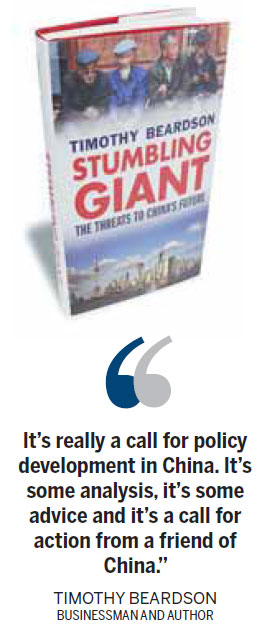Subtle style
Updated: 2013-07-16 07:14
By David Bartram (China Daily)
|
||||||||
|
Timothy Beardson brings to light the daunting array of challenges that today confront China and calls for a more balanced view of China's future. Provided to China Daily |

A writer who has been in China for 35 years attempts to offer a more nuanced view of where the country is heading. He shares his views with David Bartram.
Predicting China's future has become its own industry in recent years, but as publishers search for the next best-seller, a culture of sensationalism has developed with claims and counter-claims becoming more radical.
A glance at the China titles in your local bookstore might lead a casual observer to believe China is either on the brink of world domination or total collapse.
Timothy Beardson, who brings with him 35 years of experience working with China, believes he's the man to offer a more nuanced view of where the country is heading with his new book, Stumbling Giant: The Threats to China's Future.
"What rather annoys me are the histrionic titles you get in the China genre," Beardson says. "You get titles such as When China Rules the World or The Coming Collapse of China. I don't know how anyone can put their name to a title like that because it's just all nonsense."
Beardson was 27 when he moved to Hong Kong in 1978. With China beginning its process of opening up, he visited the mainland within a month upon arrival. By 1984 he had set up an investment bank, Crosby, which became the first international investment bank to open on the mainland.
Stumbling Giant was borne out of a lecture Beardson delivered on China's future at the Yale University in 2009, which the university's publishing arm asked him to develop into a book.
"Part of this book is really to say China has done fantastically for 30 years but we really need radical, early and deep reforms if we are going to keep the show on the road. It's really a call for policy development in China. It's some analysis, it's some advice and it's a call for action from a friend of China."
Although Beardson's expertise lies in finance, his book is ambitiously broad in its attempts to analyze the key challenges facing China over the coming decades. Chapters tackle everything from the environment, to education and demographics.
"I really felt this wasn't an economic story or a foreign affairs story or a business story. It's actually a multi-disciplinary analysis that needs to be made. I've even tried to look at things you wouldn't imagine, such as the role of the Chinese language on China's development.
"I've tried to raise different ways to move forward, as we all want China to be a success and I think it's good to debate and discuss the issues involved," he says.
One of Beardson's biggest concerns relates to demographics. With China's population due to begin declining by 2027, combined with rising life expectancy and a growing "silver population", China's economy will have to adapt to provide for elderly dependents.
"The demography really concerns me because that is one area that no government policy today can possibly change for the next 50 years. China's demography is now set in stone."
Beardson is well aware that looking into the crystal ball can be dangerous when it comes to China, a country that has experienced an economic transformation over the last 30 years on an unprecedented scale.
"I think trying to micro-predict China's future is a fool's errand. I wouldn't want to get into short-term projections. What I think is easier is to see the longer-term trend. If you look at the demographics, all the people who matter for this projection that we are making have already been born. It makes it easier as you can either be a little bit wrong or you can be right. You can't be a long way wrong," says Beardson.
This approach runs against many of the more cruder economic predictions for China's future, which Beardson argues are of little use without a broader context.
"There is a strong tendency in human nature to extrapolate existing trends. Goldman Sachs will announce the exact year China will overtake the American economy, but this is just an extrapolation of the trends we are seeing at the moment.
"I would argue that throughout history trends have changed as much as they have stayed the same and we should look at the things that make trends change, like demographics and education."
With this in mind, Beardson argues, China must find new ways to maintain high economic growth as the population peaks and wages rise.
"If you are going to grow the Chinese economy by a good clip over the next few decades you need to make further reforms. You need to encourage the service sector to take over from manufacturing. It means encouraging an innovation economy, because we can no longer be a low cost manufacturer when the demographics go against that. It means tackling the education system and the universities, too."
Beardson is personally involved in education as the chairman of the China Oxford Scholarship Fund, which assists low-income Chinese students to take postgraduate studies at Oxford University.
It will be some of these ambitious young students who are tasked with tackling the problems China faces over the coming decades.
"The Party has been extraordinary successful at adapting itself since the time of Mao Zedong. I just feel there is a case for saying that over the last decade that adaptability has been less evident.
"I'm really calling for the Party and the government to improve the governance with which they implement the policies. The policies are not necessarily bad, they are often quite good.
"But they are often not implemented. I'm not discussing government. The government has delivered fantastically for 30 years. I think the last 10 years are an example of China being a bit lost. I would just like to see re-engagement and a commitment to real reforms."
While Beardson is critical of certain choices China has made, particularly over the past decade, he hopes his book will be welcomed within the country. He dedicates Stumbling Giant to China, wishing the country a prosperous, successful and happy 21st century.
"I will have to take the risk that my book is misinterpreted by some, but I think there are lots of people who are aware I am a friend of China."
(China Daily 07/16/2013 page19)

 Victoria Beckham S/S 2014 presented during NYFW
Victoria Beckham S/S 2014 presented during NYFW
 'Despicable' minions upset Depp's 'Lone Ranger' at box office
'Despicable' minions upset Depp's 'Lone Ranger' at box office
 'Taken 2' grabs movie box office crown
'Taken 2' grabs movie box office crown
 Rihanna's 'Diamonds' tops UK pop chart
Rihanna's 'Diamonds' tops UK pop chart
 Fans get look at vintage Rolling Stones
Fans get look at vintage Rolling Stones
 Celebrities attend Power of Women event
Celebrities attend Power of Women event
 Ang Lee breaks 'every rule' to make unlikely new Life of Pi film
Ang Lee breaks 'every rule' to make unlikely new Life of Pi film
 Rihanna almost thrown out of nightclub
Rihanna almost thrown out of nightclub
Most Viewed
Editor's Picks

|

|

|

|

|

|
Today's Top News
Going green can make good money sense
Senate leader 'confident' fiscal crisis can be averted
China's Sept CPI rose 3.1%
No new findings over Arafat's death: official
Detained US citizen dies in Egypt
Investment week kicks off in Dallas
Chinese firm joins UK airport enterprise
Trending news across China
US Weekly

|

|








